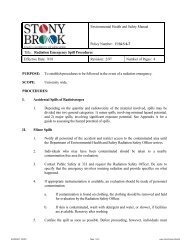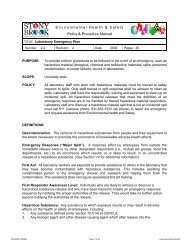Occupational Exposure to Bloodborne Pathogens - Stony Brook ...
Occupational Exposure to Bloodborne Pathogens - Stony Brook ...
Occupational Exposure to Bloodborne Pathogens - Stony Brook ...
You also want an ePaper? Increase the reach of your titles
YUMPU automatically turns print PDFs into web optimized ePapers that Google loves.
How is the virus spread?<br />
Hepatitis B virus can be found in the blood and, <strong>to</strong> a lesser extent, saliva, semen<br />
and other body fluids of an infected person. It is spread by direct contact with<br />
infected body fluids; usually by needle stick injury or sexual contact. Hepatitis B<br />
virus is not spread by casual contact.<br />
What are the symp<strong>to</strong>ms of hepatitis B?<br />
The symp<strong>to</strong>ms of hepatitis B include fatigue, poor appetite, s<strong>to</strong>mach pain, fever,<br />
nausea, vomiting and occasionally joint pain, hives or rash. Urine may become<br />
darker in color, and then jaundice (a yellowing of the skin and whites of the eyes)<br />
may appear. Adults are more likely than children <strong>to</strong> develop symp<strong>to</strong>ms; however,<br />
up <strong>to</strong> 50 percent of adults who have acute infection do not have any symp<strong>to</strong>ms.<br />
How soon do symp<strong>to</strong>ms appear?<br />
The symp<strong>to</strong>ms may appear six weeks <strong>to</strong> six months after exposure, but usually<br />
within four months.<br />
For how long is a person able <strong>to</strong> spread the virus?<br />
The virus can be found in blood and other body fluids several weeks before<br />
symp<strong>to</strong>ms appear and generally persists for several months afterward.<br />
Approximately 10 percent of infected adults may become long-term (chronic)<br />
carriers of the virus. Infants infected at birth have a 90 percent chance of<br />
becoming chronically infected.<br />
What is the treatment for hepatitis B?<br />
There are no special medicines or antibiotics that can be used <strong>to</strong> treat a person<br />
that is acutely infected once the symp<strong>to</strong>ms appear. Generally, bed rest is all that<br />
is needed. Interferon is the most effective treatment for chronic HBV infection<br />
and is successful in 25 <strong>to</strong> 50 percent of cases. Chronic carriers of HBV should<br />
avoid drinking alcohol or taking medications which are harmful <strong>to</strong> the liver, as<br />
these actions can make the liver disease worse.<br />
What precautions should hepatitis B carriers take?<br />
Chronic hepatitis B carriers should follow standard hygienic practices <strong>to</strong> ensure<br />
that close contacts are not directly contaminated by his or her blood or other<br />
body fluids. Carriers must not share razors, <strong>to</strong>othbrushes or any other object that<br />
may become contaminated with blood. In addition, susceptible household<br />
members, particularly sexual partners, should be immunized with hepatitis B<br />
vaccine. It is important for carriers <strong>to</strong> inform their dentist and health care<br />
providers.<br />
EHSD0326 (10/08) Page 4 of 12 www.s<strong>to</strong>nybrook.edu/ehs
















